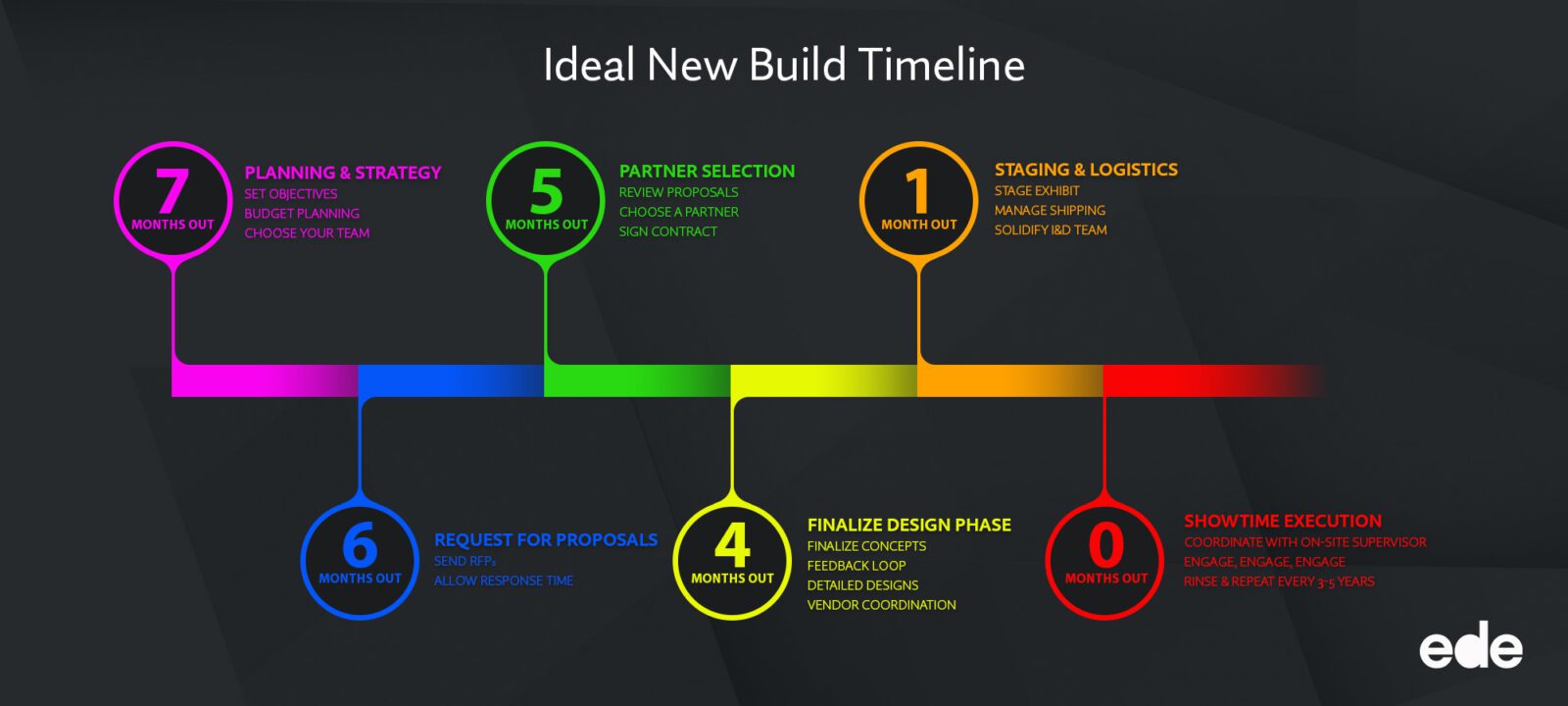
Building a new trade show exhibit can seem like a monumental task, but a well-planned timeline and a series of key milestones, it becomes a smooth and successful journey. This process can take as long as a year or as short as a month. But remember: You can have it cheap(er), fast, or good. But you can only pick two. So your best bet is to start sooner so that you can have it cheap(er) and amazing!
EDE’s Senior Project Manager Scott van Hees says the best time to start planning your next exhibit is the day after your trade show ends. If you’re looking for the sweet spot, really get the ball rolling about seven months before you need the exhibit.
Here’s a comprehensive guide to ensure your next exhibit is a showstopper and maximizes your trade show marketing efforts, with expert advice from Scott.
Spoiler alert: It’s easier than herding cats. Which is Scott’s specialty!

What You'll Learn
- Planning & Strategy
- The RFP Process
- Partner Selection
- Finalizing the Design
- Staging & Logistics Planning
- Marketing Push
- Showtime Execution
- Advice for Event Marketers

7 Months Out: Planning and Strategy
- Set Objectives: Define your goals for trade show marketing. Are you looking to generate leads, launch a new product, or boost brand awareness? Whatever it is, make sure it’s SMART (Specific, Measurable, Achievable, Relevant, Time-bound).
- Budget Planning: Establish a realistic budget that covers design, fabrication, logistics, and any contingencies. Pro tip: Add a little extra for those “Oh, we didn’t think of that!” moments. You’ll thank us later. (Read more on budgeting for your trade show booth.)
- Choose Your Team: Assemble a dedicated internal events team if you don’t have one. Teamwork makes the dream work! Even having one other person to bounce ideas off is better than going it alone.

6 Months Out: Send RFPs
- Send Out RFPs: Draft and send out Request for Proposals (RFPs) to 3-5 exhibit houses. Think of it like speed dating — find the one that gives you butterflies (in a good way).
- Response Time: Allow 3-4 weeks for exhibit houses to respond to your RFPs. Good things come to those who wait (but not too long).

5 Months Out: Partner Selection
- Review Proposals: Evaluate the proposals received from exhibit houses, considering factors like design capabilities, budget, and past experience. It’s like comparing apples to oranges, but juicier.
- Choose a Partner: Select the exhibit house that best aligns with your vision and needs. Swipe right on the one that gets you.
- Sign Contract: Finalize and sign a contract with your chosen exhibit house, clearly outlining deliverables and timelines. Now you’re officially in a committed relationship!

4 Months Out: Finalize Design Phase
- Finalize Concepts: Your exhibit house has already provided you initial designs. It’s time to finalize those ideas. Collaborate with your exhibit house to develop concepts that align with your brand and trade show marketing objectives. Think big, dream bigger.
- Feedback Loop: Share these concepts with key stakeholders for feedback and revisions. Remember, Rome wasn’t built in a day, and neither is your exhibit.
- Detailed Designs: Approve the final design, including floor plans, 3D renderings, and material specifications. The devil’s in the details, so don’t skimp here.
- Vendor Coordination: Work with your exhibit house to select reliable vendors for various elements such as AV, lighting, and furniture. Assemble your dream team!
- Pro Tip: Schedule weekly phone calls to discuss progress and make adjustments, even if it’s just 15 minutes to check in. All good relationships are founded on communication. Besides you don’t want them spending all their time on an LED wall that just going to loop a video when you really care about those product display pedestals!

1 Month Out: Staging and Logistics Planning
- Staging the Exhibit: Consider arranging for the exhibit house to stage the exhibit, allowing you to see it fully assembled before shipping. Consider it a dress rehearsal — don’t forget to say “break a leg.” (NOTE: This is optional, and there is an additional cost. But the peace of mind is priceless.)
- Shipping and Handling: Plan the logistics for shipping the exhibit to the trade show location, including customs if necessary. Time to test your Tetris skills! Or better yet, choose an exhibit house that handles this headache and save the aspirin for a different headache.
- Installation and Dismantling: Coordinate with the exhibit house for installation and dismantling services, ensuring you have a team on-site during these phases. (Check out our article on Dismantling best practices.)

Showtime: Execution
- On-Site Management: Ensure your team is ready to staff the booth, engage with attendees, and capture leads. Showtime, folks!
- Engagement: Utilize interactive elements to draw in attendees and keep them engaged. Make it memorable!

Advice for Event Marketers:
- Start Early: Begin planning at least a year in advance to ensure you have ample time for each phase.
- Stay Flexible: Be prepared to adapt to changes and challenges that may arise during the process.
- Communication is Key: Maintain clear and consistent communication with your team and exhibit house to ensure everyone is on the same page.
Boxing It Up
With these milestones and tips, you’re well on your way to creating an impactful and memorable trade show exhibit that enhances your trade show marketing efforts. If you have any questions or need assistance, feel free to reach out to our expert team at EDE. We’re here to help you every step of the way.


